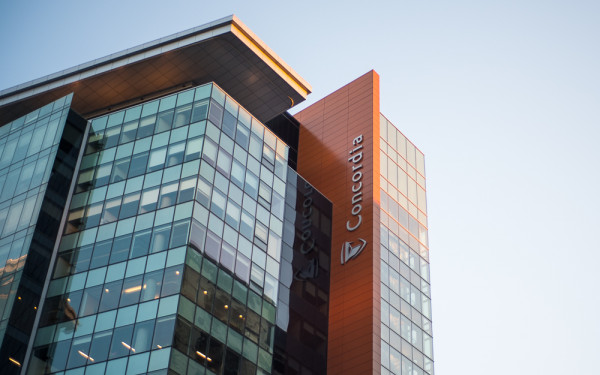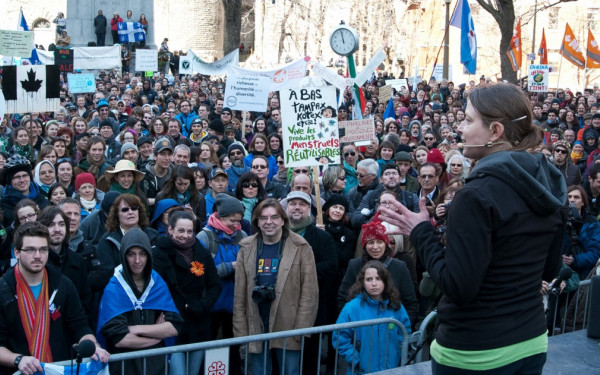Slow Down & Smell the Cooking
Looking Past the Mythology of Sustainable Food
What is sustainable food? Ask that question of a few local chefs, activists or scholars, and you’ll swiftly be dissuaded from trying to define it. The term, it seems, is a less achievable ideal than sad symptom—its very existence a nod to the disastrous state of the global food system.
“The reality caused the term to emerge,” said David Szanto, a lecturer in both Concordia’s Faculty of Fine Arts and the Université du Québec à Montréal’s Gastronomy Diploma program. “It’s the product of a post-industrial society that takes the ‘unsustainable’ as its status quo.”
“Only a couple decades ago, for instance,” he added, “regional Italian winegrowers would not have used the word ‘sustainability.’ The word wasn’t meaningful to them. They didn’t need it.”
But on to the good news: though ‘sustainable’ food is rapidly becoming mythologized, it has reconfigured our awareness of food systems along the way and—most importantly—left behind a vibrant trail of forward-focused practices.
And though few would give them credit, those aforementioned Italian winegrowers actually seem to have a lot to do with this.
Flashback to October 1985: McDonald’s opens up shop in Rome, their first Italian branch. A feisty group of Piedmont viticulturists, with Carlo Petrini as their figurehead, band together to ensure the protection of their unique and longstanding methods of cultivation, creating the Slow Food Movement.
By coalescing, they also ended up securing the economic viability of small-scale food producers. Whether due to savvy PR or fortuitous timing, the Italian “slow food” concept managed to capture the world’s attention.
Here in Montreal, slow food has also taken hold.
Espousing its forefathers’ campaign for “good, clean and fair” gastronomy, the Montréalais movement has, since 2004, been trying to connect city-folk to regional producers and global food campaigns alike.
But the local wing has never contented itself with lobbying alone. Its upcoming 5 à 7 Slow, for instance, is a rare concoction of superstar local chefs, high-quality Québécois products and innovative culinary spaces.
“We always hold 5 à 7 Slow at a locale embodying one or more of our core values, and we naturally end up partnering with chefs who believe in the philosophy,” said Bobby Grégoire, the association’s Montreal president. This month’s version takes place at Golden Plate-award-winner Martin Juneau’s new restaurant Pastaga (6389 St-Laurent Blvd.).
Paying homage to those original Piedmont producers and their recently-released “Slow Wine Guide,” the evening is centred around six natural Quebec wines, all matched to Juneau’s small, apéritif-sized plates.
Taste and table remain paramount to food advocacy, according to Grégoire.
“The 5 à 7 idea is about conviviality, creating accessible, low-cost spaces for people to come together and enjoy local products,” he says, adding that the price tag (approx. $35) is not inflated with overhead or admin costs like other galas or foodie events. “I think it would be almost impossible to find this much top-quality wine and food for this price.”
Grégoire isn’t on a sales pitch. Most Slow events sell out quickly, so he hardly has to hawk it. Furthermore, call Pastaga for a price list, and you’ll see that $35 normally doesn’t get you much past a wine and a starter.
Past 5 à 7 venues have showcased locavore or fair-trade initiatives in neighbourhoods as diverse as the Plateau, St. Henri, Mile-End and Verdun.
For Szanto, the Slow Food model is useful in that it replaces the weary ‘sustainability’ buzzword with a set of specific, ongoing practices.
“Sustainability, as it’s used today, wasn’t part of Slow Food’s consciousness when it started in Italy. It was about a set of actions, such as educating the public, supporting local producers, or preserving traditional methods,” he said. “In my opinion, this is a much better way to talk about sustainability: break it down into concrete objectives.”
If a participative awareness of the food cycle can heighten one’s gustatory experience, then let it be known that the 5 à 7 Slow is only the tip of the local gastronomical iceberg. Check out the sidebar to the left for a quick and dirty glance at how to grow, cultivate and compost your own food in the city.
COMPOSTING
Slow Ways to Dirty Your Hands
Your apartment didn’t come furnished with a compost heap? You can still send those onion peels to a happy home. Here are five ways:
Santropol Roulant
The award-winning Plateau nonprofit resto began vermicomposting—that’s composting with worms, to the uninitiated—a few years ago to help nourish its rooftop gardens. The initiative, which began in a basement, has grown into a series of workshops offered at their spacious new Roy St. location. They run from spring onward, and you can call 514-284-9335 for more info.
Grow Your Own
EcoCentre Jeanne-Mance offers starter kits and instructions for home vermicomposting. It’s located at 3986 St. Urbain St., and can be contacted at 514-288-1402, or online at urbaniterre.org/services-et-produits.
Compost Montréal
This private eco-minded enterprise works in conjunction with the city’s Department of Parks and Horticulture and will pick up your compost for the reasonable rate of $5.00 per week, or $60 for 13 weeks.
Bonus: free pickup, free bin with weekly biodegradable liner bags, and a load of fresh compost at year’s end. Check it out at compostmontreal.com.
The Plateau
Move to the Plateau neighbourhood. The small but hip quadrangle, bordered by Brébeuf St. to the east, Messier St. to the west, Sherbrooke St. E. to the south and St. Joseph St. E. to the north, is where the city runs its pilot project for home organic-waste pickup.
Sustainable Concordia
Get dirty on campus. Depending on the time of year, Sustainable Concordia runs compost workshops right at your fingertips. Check it out online at sustainable.concordia.ca/ourinitiatives/r4/compost.
GARDENING
Cultivate Your Own Garden
Tired of relying on faraway farmers? Montréal is blooming with possibilities.
Action Communiterre
This a network of “communitized” backyard gardens in Notre-Dame-de-Grâce that allow you to cultivate and harvest your own produce. To join, get in touch at 514-484-0223 or visit actioncommuniterre.qc.ca.
Loyola City Farm
This ConU-based initiative showcases a converted soccer field (and more) which has been turned into vibrant plots for the People’s Potato and other community groups. Learn how to grow, and reap the rewards in a tasty People’s Potato meal! Check out concordialoyolacityfarm.wordpress.com for more info.
Your local borough
Eighteen Montreal boroughs offer 97 community gardens—there’s a plot out there waiting for you. You have to bring your own equipment, however—britches and hoes not included. Find your opportunity for growth at here.

1_900_615_90.jpg)



21_600_375_90_s_c1.jpg)

2_600_375_90_s_c1.jpg)